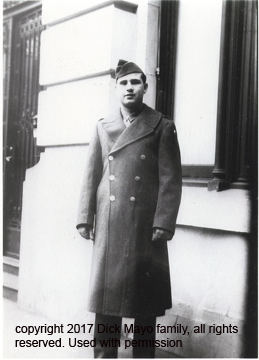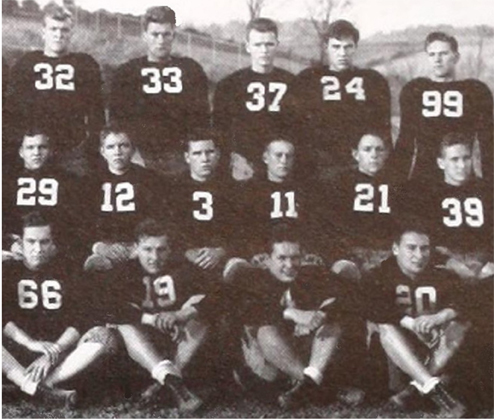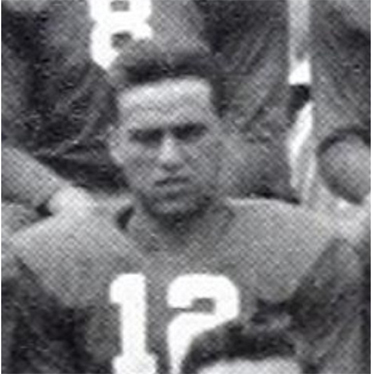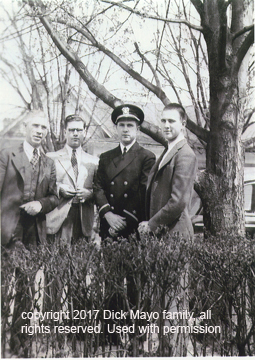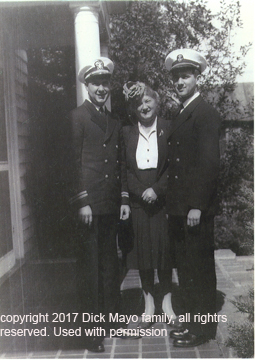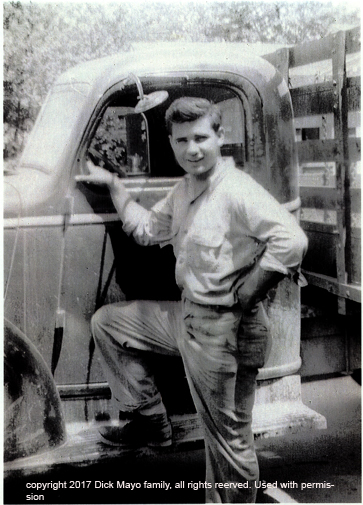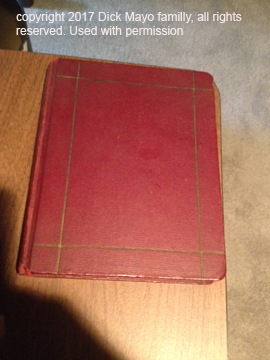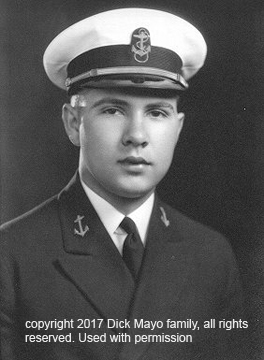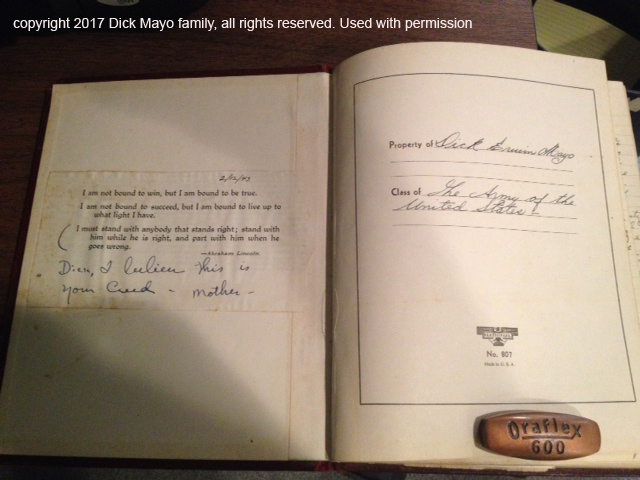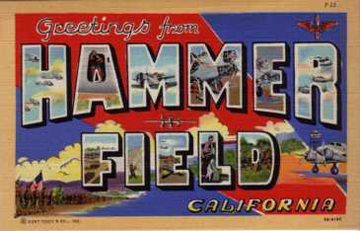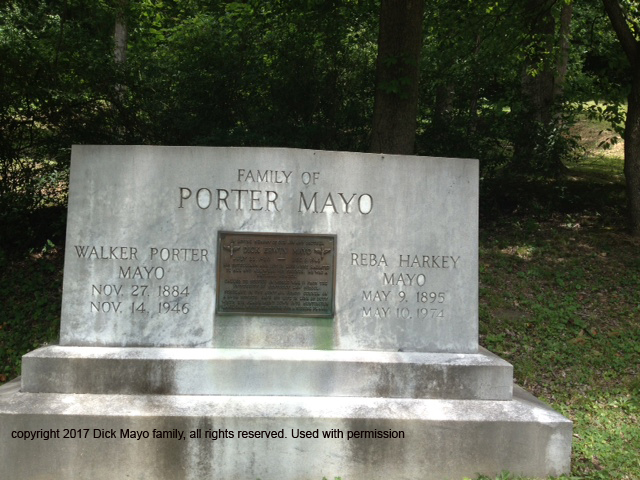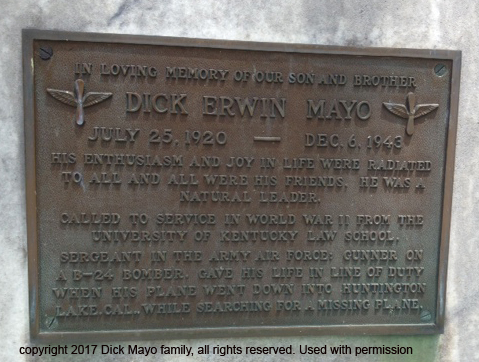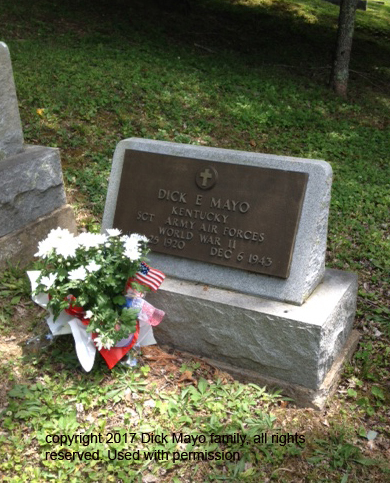|
|
|
Dick Erwin Mayo |
|
All images on this page are copyright 2017 by the Mayo family and used with permission.
|
| Before he enlisted in the United States Army on October
8, 1942, Dick Erwin Mayo was going to be a lawyer. He attended college for
four years, beginning his undergraduate career at Washington and Lee
College in Lexington, Virginia. He finished at the University of
Kentuckyís College of Law where he is listed on the World War II Honor
Roll for the class of 1943. Not unusual at the time, Mayo began law school
without finishing his bachelorís degree.
Dick Mayo, 1941, and the Washington & Lee football team An issue of the Floyd County Times that reports on Dickís disappearance. "Sgt. Mayo volunteered for air service while a law student as the University of Kentucky." The article describes Mayo as a graduate of Prestonburg High School where he was, "prominent in athletics," going on to say, "he was one of the townís finest young men." His brothers were no less gifted. Older brother Louis Harkey Mayo, known as Harkey to the family, (May 20, 1919-August 23, 1988), attended the United States Naval Academy and, once war was declared, in the US Navy where he was awarded the Bronze Star for courage in the battle of Leyte Gulf. Afterward the war he was a distinguished lawyer, a professor of constitutional law, and then vice president of George Washington University. Younger brother Walker Porter Mayo (September 20, 1922-September 7, 2003) also served in the Navy, got his medical degree in 1946 and eventually became the first thoracic surgeon to practice in Lexington, Kentucky. After retirement he went back to school and earned a Ph.D. in history and, in his later years, devoted himself to the history of medicine.
Walker Porter Mayo Sr. and his three sons, Porter Jr., Harkey, and Dick
Reba Harkey Mayo with her sons, Harkey (L) and Porter Jr. (R) Born July 20, 1920, Dick Erwin Mayo was the adventurous and well-adjusted middle child of Walker P. Mayo (November 27, 1884-November 14, 1946), an attorney in Prestonburg, Kentucky and Reba Harkey Mayo (May 9, 1895-May, 1974). According to his nephew, David Mayo, Dick was named in honor of either his grandfather, John Dick Mayo, his uncle (sharing the same name), or both. In any event, Dick was never known in his family as "Richard." That use seems to have appeared for the first time in 1943 with official documents relating to the loss of Exterminator. It may be a moniker given by the War Department, as this is also the manner in which his name is listed in Honor Rolls.
Dick Mayo (circa 1941) At the time of Dickís enlistment, to become a pilot a boy still needed to complete at least two years of higher education. Dick decided he would do his part but he would do it his way. His two brothers had chosen the navy and the officer corps. With his background and education Dick could have done the same. He didnít have to choose the ranks but that was his decision. Three of Dick Mayoís nephews, David, Dick, and Walker Mayo contacted me because they had learned, by chance, I was writing a book about the Hester Lake and Huntington Lake reservoir B-24 Liberators. Through them I was able to gain a deeper appreciation of their uncle because they were willing share Dickís diary. Begun four days after his enlistment, on October 12, 1942, and ending November 15, 1943, Dick Mayoís diary provides a snapshot not only of his character but his state of mind across the next thirteen months. His excitement about a grand adventure is palpable but so too is his boredom with, "the long hours of routine moving and mass handling which is necessary in an army." Throughout, Dick expresses his nervousness and uncertainty about the future along with occasional periods of self doubt.
The cover of Dick Mayo's diary In the beginning heís quite pleased with himself. Dick did so well on all his ground forces classification tests he was given his choice of which school to attend. He opted for mechanics school. He kept hoping to be sent south, where it was warm; he kept being sent north. He started in Atlantic City in mid-November, then was sent to New York City where, "the weather is even colder...and the language a little more foreign." To his diary he admits enjoying every day of being in the Army and recognizes, "it is doing me a world of good," though he also admits, "The army is not an easy life and can get mighty lonesome at times." But the adventurous nature of his new experience keeps him in good morale. That, and a goodly supply of letters from back home which, "I appreciate very much." The school in New York is pretty posh by Army standards. "Our barracks is a new apartment building and is a great set up for a soldier." There are maids who clean the soldierís rooms and, "No K.P. duty." The classes are, "as hard as any I ever had in college," but theyíre, "a little more interesting." Some of the loneliness Dick feels, and the desire for something familiar, comes out in a November 22 diary entry when he writes about going to church for the first time since entering the army. "For the last several days I have had a strong desire to attend church service. I canít explain why, but I wanted to go to church and that is what I did." He couldnít find a Methodist church close by and ended up attending an Episcopal service which he found, "very different," but enjoyable. Best of all, "the people were very nice to me." Dick and his older brother, Harkey, managed to get together a couple of times in New York, including for Thanksgiving. After dinner they called home. "Mother and Daddyís voices sure did sound good."
Harkey Mayo, Dick's older brother A good southern boy, Dick is still having trouble acclimatizing to the Northeast weather. One of his buddies wants to set him up with a date but, "If the girls are as cold as the weather, I think Iíll stay home and read." A month later his social life has picked up nicely after meeting a Prestonburg (his home town) girl, the sister of a friend he knows well. "New York seems like a much better city when there is someone to go places with." Christmas is coming up soon and heís not looking forward to spending it alone - his lady friend having returned home for the holidays. Good luck finds Dick when he and another southern boy, John Waites, are invited by a South Carolinian family to Christmas dinner. Waites is from Alabama and Dick tells his diary that Waites, "is the first boy Iíve met since Iíve been in the Army that I would like to develop into a close friend. He is a good clean boy whom Iím sure I would enjoy running around with." Probably reflecting his own mood, Dick writes, "Boy, was he (Waites) homesick Xmas." With the new year comes new challenges, worries, and decisions to make. Soon, Dick will finish airplane mechanicís school at the end of February and heís going to have to figure out what to do next. He could apply for officerís training. The thing is, Dick really likes the work heíd doing, believing it a, "great future," for after the war - apparently, for the time being, not considering a return to law school. "There is a better chance for me to see action if I continue with this than if I go to officerís school," he tells his diary. But then, "There is the question of prestige and other things which an officerís uniform carries with it." He finishes the entry with what really worries him the most about going the officer route. "Iím also afraid I would want to get married if I got the commission." Not that there are any wives on the horizon. The Prestonburg girl seems no longer even a memory.
Front pages from Dick Mayo's diary At first glance it appears odd that Dick is so sanguine about throwing away his career in law for that of an aircraft mechanic. But that kind of wavering makes sense in context of the totality of Dickís diary where he continually returns to several serious themes: his certitude the war will not be a short one; a desire to get into the thick of it sooner rather than later; a longing not only for home but a home of his own, preferably married life on a farm. Despite an occasional grouse here and there, Dick Mayo is relentlessly upbeat. Every change of duty station brings effusive comments of how beautiful the place is. Even the brown, flat plains of San Antonio, Texas elicit a rapturous description as, "the first country Iíve seen that compares favorably with Kentucky." Dickís entries, which read more like an extended letter to himself, are often broken by several weeks of inactivity. And it isnít as if he is too busy, as he admits from time to time. No, Dick Mayo comes across as not an occasional jotter of ephemerata but an inwardly drawn young man thinking deeply about his subject. Itís been said that some folks like to think with their mouth open. Dick wasnít like that. He appears to have appreciated the power of clarity that comes from seeing thoughts committed to paper. So, Mayo hems and haws about whether officerís candidate school is a better idea than remaining in the ranks. Being an officer means more prestige - which will impress the girls. But for a boy who is itching to get into the action, leaving aircraft mechanics behind for aerial gunnery school is much more attractive. And thatís the path he chooses to follow. The other boys in the mechanicís shop must have thought Dick Mayo was out of place. College educated, a year or something like that in law school. One brother a lawyer and a naval officer, the other in medical school. Who was this guy? The same thoughts must have swirled around Dickís head too because he wrote, "The boys are calling me ĎSquireí now because of my big cigars, horn rimmed glasses and legal status. They come to me about their income taxes, divorces and letter writing." He professes to himself of not knowing the reason for his popularity but, "I like to help them and they have built up some confidence in me." Otherwise the boys might have considered Dick a "stick in the mud." On a hitch-hiking ramble to Matamoros in Mexico from gunnery school in Harlington at the southern tip of Texas, "Most of the boys headed straight for the red light district or the bars but I managed to stay away." With wry humor he adds, "They are all worried this week about having a venereal disease." Mexico amazed Dick. Visiting the country had been a, "life-long desire," and he found like many boys then and since, "The Rio Grande River is the greatest dividing line I ever saw." Matamoros was, "really one dirty place." But he found the central market in town, "the most interesting place," where, "everything imaginable is sold." In late September, with his promotion to sergeant in hand, Dick moved from Texas to Boise, Idaho. He liked it there because it was, "clean and very well equipped for entertainment," though he rued, "If I could have just one good date I would give anything. Itís been so long since Iíve been out with a girl I feel like a hermit." Lack of an entertaining partner meant he could send some money home for after the war. "If I can keep it up until I get out I may have enough to start building that house up at the farm and raise some real grapes and horses." From Boise, Dick soon moved on to Wendover, Utah for five more weeks of gunnery training. Wendover is the only place in Mayoís travels where he had nothing nice to say. "We are 110 miles from Salt Lake City and there is nothing between here and there except salt flats. There is not a tree in 75 miles. There is a scarcity of water here and itís all cold." On the up side, this is probably where Dick met Don Vande Plasch and Richard Spangle for the first time. On November 2, 1943 they all moved to Fresno, California and Hammer Field. After the "hell hole" of Wendover, Dick loved Fresno. "The weather is nice, feels just like spring back in Kentucky." A week later the crew met their pilots for the first time.
Hammer Field was to be the last station for all the boys before heading off to war. In fact, they would all leave at the turning of the new year. And that fact makes the next confidence in Dickís diary a terribly sad one. "We have been scheduled for eight hrs of flying every other day but due to the faulty condition of the planes we have spent most of the time on the ground." As George Barulic told me, the boys on Exterminator didnít really know each other very well because they hadnít spent much time as a crew. Now we know from Dickís diary that as of November 15, 1943 they had made only one flight together. It may be the flight they took on December 6th, looking for 463, was either their second or third.
|
| | Home | The Crews | B-24 Liberator | Media | Links | Images| |
| | The Author | Books by Peter Stekel | Press Packet | Contact | |
|
|Extended end notes from Beneath Haunted Waters|
|
|
copyright 2017 by Peter Stekel - all rights reserved |

